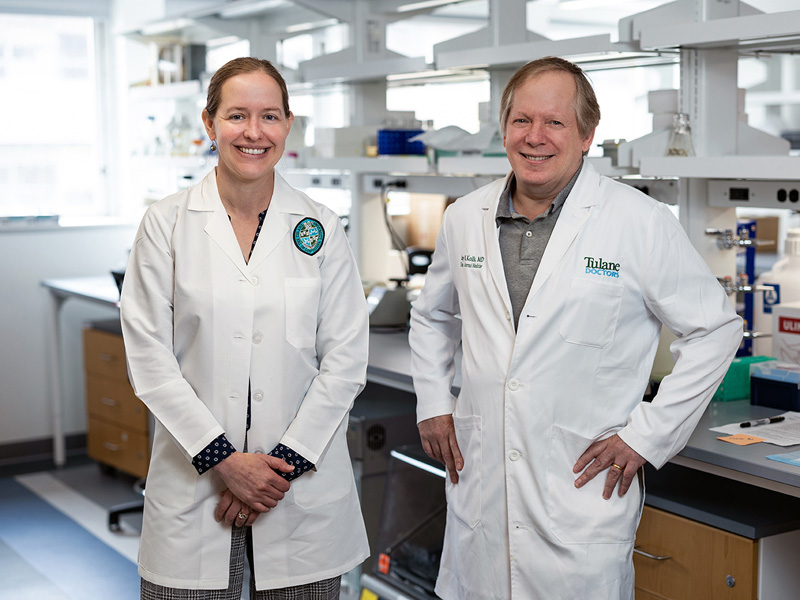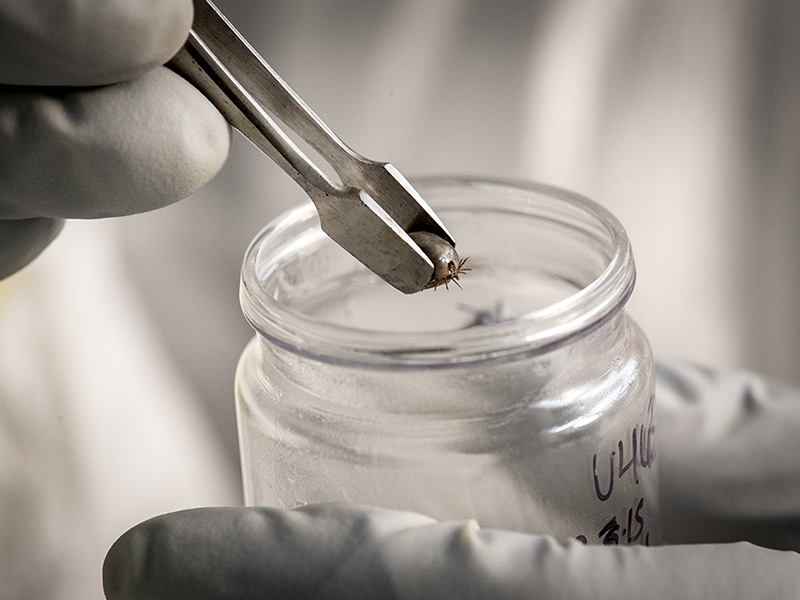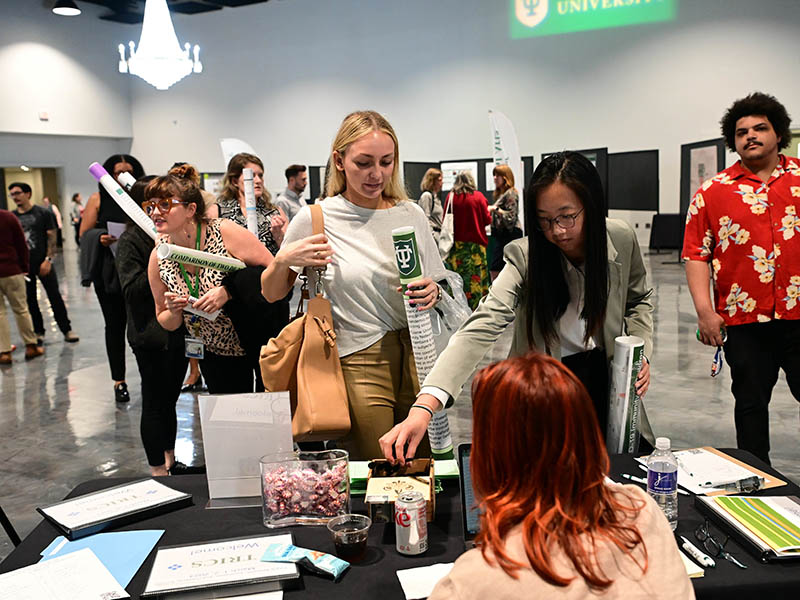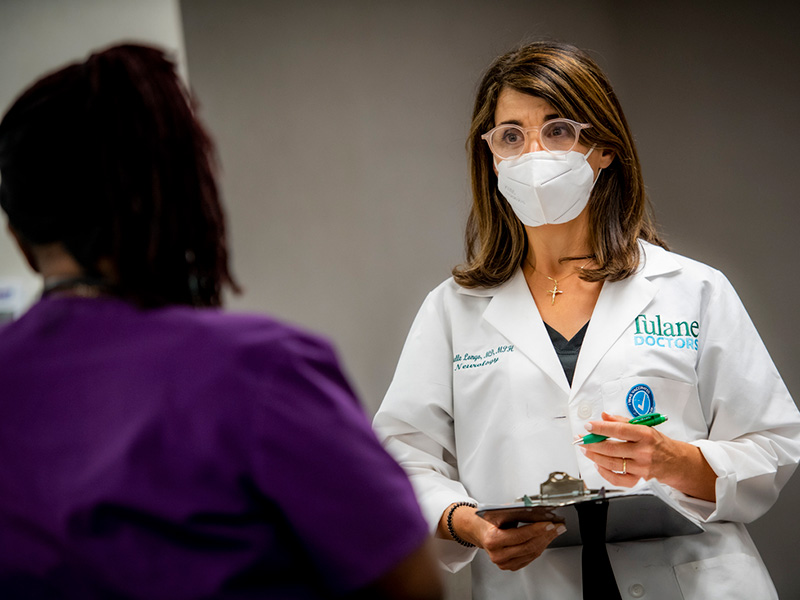Research Like No Other
Tulane has a history at the forefront of groundbreaking research. From our founding combating infectious disease, to finding innovative solutions to wetland erosion, environmental challenges and other global problems, Tulane has long been a hub of meaningful exploration and discovery. Tulanians are dedicated to tackling the toughest challenges.

Hope for a New Vaccine
Klebsiella pneumoniae is a leading cause of hospital acquired pneumonia and a major cause of childhood pneumonia in parts of the world, with a high incidence of serious infections and no vaccine currently available. Elizabeth Norton, PhD, and Dr. Jay Kolls invented an experimental nasal spray vaccine that targets this type of pneumonia in high-risk populations. Earlier this year, the National Institute of Allergy and Infectious Diseases awarded them a contract worth up to $16 million to bring the vaccine to Phase One clinical trial.

Scientists Supporting Other Scientists
Tulane had just partnered with Kharkiv Polytechnic Institute in Ukraine to collaborate on solar energy research when a surface-to-air missile from Russia destroyed one of its labs in Kyiv. Tulane physicists Denys Bondar, PhD, a native of Ukraine, and Matthew Escarra, PhD, wasted no time in lending support, sending solar cells from their lab and using personal funds to replace electronic equipment. Said Bondar, “This is truly the embodiment of Tulane’s motto: ‘Not for oneself, but for one’s own.’”

Preventing Dangerous Infections
As cases of Lyme disease rise across the world, researchers at Tulane are studying if the same technology behind a successful Lyme disease vaccine for dogs can also protect humans against the tick-borne infection. With a $1.3 million grant from the National Institutes of Health, a research team is studying a vaccine that elicits a long-lasting immune response to the bacteria responsible for Lyme disease. The study is being led by Tulane immunologists Lisa Morici, PhD, and James McLachlan, PhD, along with Monica Embers, PhD, who has long been at the forefront of new Lyme diagnostics, preventatives and treatments.

A Beacon for Scholarship
Tulane was inducted into the prestigious American Council of Learned Societies Research University Consortium, prompting its president to refer to the university as “a beacon for liberal arts education.” Tulane will now be included in some of the most important and vibrant conversations about the future of the humanities in academia. The consortium plays a vital leadership role in helping to sustain and enhance the humanities at the nation’s leading research universities.

Research on Display
Tulane’s interdisciplinary research and collaborations are among its greatest strengths, having led to many groundbreaking discoveries. The breadth of work in such areas as sea-level rise, vaccines and therapeutics inspired Vice President of Research Dr. Giovanni Piedimonte to host the inaugural Tulane Research, Innovation and Creativity Summit in March. The annual event featured presentations, lectures, panel discussions and displays that highlighted the scholarship of Tulanians across campuses, from carbon capture research to COVID-19 to diabetes.

A Gift of Language and Art
Tulane’s Roger Thayer Stone Center for Latin American Studies received a major boost this year when the Zemurray Foundation donated $1.3 million to create two endowed funds for the study of Latin American Indigenous languages and art history. Named for the late Tulane archaeologist Doris Z. Stone and Tulane professor emerita and preeminent art historian Elizabeth Hill Boone, PhD, “the funds will greatly expand the center’s offerings, making an already stellar program that much better,” said Stone Center Director Thomas Reese.

Help for Those With Long COVID
As the challenge of treating and preventing COVID-19 unfolded, Dr. Michele Longo, assistant professor of neurology at Tulane University School of Medicine, along with a team of Tulane Faculty Members, pioneered new research around the disease. But the fight isn’t over — now, researchers have moved on to help long COVID patients battle against fatigue, brain fog and other lingering symptoms. Tulane staged a symposium for healthcare providers to help them deliver better-specialized care for the estimated 1 in 5 American adults still suffering from symptoms of long COVID. The event brought together national experts to discuss treatments, the impact on health symptoms and what the future may hold for those suffering from the illness.

Steps to Curb Diabetes
For those with diabetes, or at risk of the disease, Tulane researchers believe cutting back on carbohydrates can go a long way in helping to lower blood sugar. Their study, published in the journal JAMA Network Open, paves the way for research about how to mitigate the health risks of those with prediabetes and diabetes not treated by medication.
